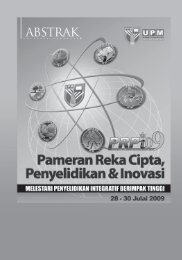BUKU ABSTRAK - Universiti Putra Malaysia
BUKU ABSTRAK - Universiti Putra Malaysia
BUKU ABSTRAK - Universiti Putra Malaysia
Create successful ePaper yourself
Turn your PDF publications into a flip-book with our unique Google optimized e-Paper software.
Utilisation of Problem-based Learning in Enhancing Learning of Calculus for<br />
Engineering Students<br />
Assoc. Prof. Dr. Rohani Ahmad Tarmizi<br />
Mohd. Zin Mokhtar, Ahmad Fauzi Mohd. Ayub and Mokhtar Dato’ Hj. Nawawi<br />
Institute of Mathematical Research, University <strong>Putra</strong> <strong>Malaysia</strong>,<br />
43400 UPM Serdang, Selangor, <strong>Malaysia</strong>.<br />
+603-8946 6889; rht@educ.upm.my<br />
Keywords: Problem based learning, calculus, Mathematics education, performance<br />
The Development of the Mediated Employer-Employee Language Profile (MELP) as a<br />
Mechanism to Benchmark English Language Needs of the <strong>Malaysia</strong>n Service Sector Industry<br />
Assoc. Prof. Dr. Rosli Talif<br />
Faculty of Modern Languages and Communication, University <strong>Putra</strong> <strong>Malaysia</strong>,<br />
43400 UPM Serdang, Selangor, <strong>Malaysia</strong>.<br />
+603-8946 8729; rosli@fbmk.upm.edu.my<br />
119<br />
Social Sciences<br />
Calculus is an important subject for science and engineering students but they state that it is abstract, difficult<br />
and highly boring. Problem-based learning (PBL) as a student centered and active learning approaches can be<br />
used to improve students’ interests and performance in learning of calculus. This study is designed to investigate:<br />
(1) student’s perception about PBL approach in calculus; (2) student’s engagement to acquire knowledge and;<br />
(3) student’s performance in test. A group of 24 Engineering Foundation Year students was randomly selected<br />
to introduce with PBL approach in basic calculus. The rubric of student engagement, questionnaire with open<br />
ended question and post test (Calculus Achievement Test) were used to identified perception, engagement and<br />
performance of students in this approach. The study showed that the students have a positive perception towards<br />
implement of PBL approach in calculus learning. It also increases their motivation to learn calculus and observe<br />
the applicability of calculus in real-life. Pearson correlation coefficient was a medium positive correlation between<br />
engagement scores and performance with an r of 0.45 [r (24) = 0.45,p < 0.05]. These results indicated that high<br />
score in engagement during learning session are associated with high performance in Calculus Achievement Test.<br />
However, an independent samples t-test show that there was no significant difference in Calculus test achievement<br />
PBL group (M= 78.44,SD = 13.49) and TRAD group (M= 78.23,SD = 15.23); t(46) = 0.05,p = 0.960 > 0.05). This<br />
pedagogical approach has made the teaching and learning of calculus more interesting and effective. It is also able<br />
to develop the potential of individuals to be more creative, critical in thinking and effective in problem solving.<br />
The Mediated Employer-Employee Language Profile (MELP) project focuses on establishing a profile to<br />
benchmark English language needs for the enhancement of employability of <strong>Malaysia</strong>n public university graduates,<br />
and provides a point of reference for industries to actualise their language needs. The profile mechanism attempts<br />
to offer strategies that help to match specific employment sector’s language needs to that of the prospective<br />
employee language profile. The objectives of the study address language needs in relation to employability<br />
through an exploration of attitudes, importance of English, use of English, and the devising of a mechanism that<br />
can help match English language needs between graduates and the private employment sector. Both quantitative<br />
and qualitative procedures were utilised to obtain data for the project. The quantitative data comprised surveys<br />
of employment needs and language audits. The qualitative data were obtained via interviews and field notes. The<br />
project was designed to constitute three major phases. The first phase involved getting information on attitudes<br />
and perceptions on English language needs. The second phase evaluated the importance and use of English, and<br />
level of readiness of students, particularly those of industrial training students, to function at the workplace. The<br />
second phase also targeted at the explication of the nature and relevance of the English language programmes at<br />
tertiary institutions. The final phase constituted the development of the MELP mechanism which was anticipated<br />
to capture the differing English language needs specific to each identified employment subsector. The mechanism<br />
is an important conduit for the dispensing of knowledge and information about workplace needs relevant to<br />
language education. Potential employees can appreciate and digest the values attached to differing aspects of<br />
language use in the workplace. This links the use of pragmatic research outcomes to the real world of work, which<br />
contribute to a more effective workforce for the nation.<br />
Keywords: English language needs for employability, <strong>Malaysia</strong>n public university graduates, perceptions on English<br />
language needs



